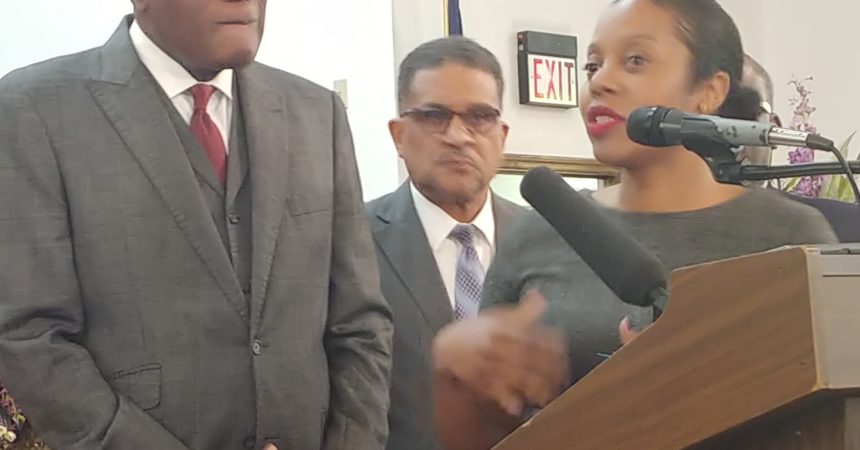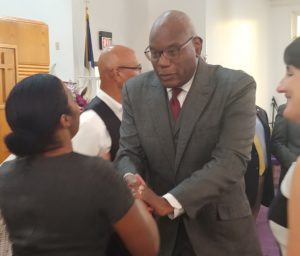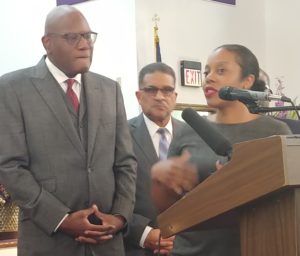
Task force touts progress on racial covenant removal
By St. Clair Murraine
Outlook staff writer
After months of working to find the best approach to do away with decades-old racial covenants in the city, a task force has completed the first phase of an effort that it hopes will result in legislative action to wipe out the language for good.
Since being formed in August, the task force drafted a resolution denouncing racist covenants in deeds. It has been adopted by several civic, business and neighborhood organizations. The city and county governments have issued similar proclamations.

Task force members Jami Coleman (left) Mario Taylor (center) and Sue Dick (right) wrap up a recent press conference with Rev. R.B. Holmes.
Photo by St. Clair Murraine
The task force, made up of a cross-section of government and civic leaders, continued to chide the offensive language at a press conference where an update on the group’s work was presented last week. Rev. R.B. Holmes, who formed the task force, called it a “red letter day” that change is obvious.
Holmes, pastor at Bethel Missionary Baptist Church where the press conference took place last Tuesday, also said the group’s progress is “historic, remarkable and simply extraordinary.”
“Most of the times when we address racial issues, it has the potential to bring out the worst or best in us,” said Holmes, who also is publisher of the Capital Outlook. “In this community, it brought out the best.
“We soundly reject the racial language in covenants. This is a proud moment.”
A handout at the press conference showed that the lengthy list of supporters for removal of racially restrictive language in residential covenants, includes the Florida League of Cities.
“Racially restrictive language is offensive and is a painful reminder of this country’s shadow of racial inequality and division,” Michael Sittig, executive director for Florida League of Cities, wrote in a letter to the task force. “And, homeowners and business owners still see the offensive language in the recording instrument because the language runs with the land and there are currently no laws in place to remove or redact the racially restrictive language.

Rev. R. B. Holmes (left) and Larry Rivers (center) listen as attorney Jami Coleman speak at a recent press conference.
Photo by St. Clair Murraine
“We believe homeowners and business owners should not experience this reminder of racism and discrimination found in recording instruments language on real property as it is offensive, unenforceable, illegal and unconstitutional and such language should be removed or redacted to accomplish such.”
The dust up over the racially restrictive language started early this past summer when Annabelle Dias found the language in documents for a home she intended to buy in Betton Hills. Attorney Jami Coleman, who is representing Dias, went public with the issue.
That prompted a press conference where Holmes and other members of the clergy denounced the covenant. A committee was immediately formed, leading to the task force that decided legislation would be the best approach to get rid of racially restrictive language.
Task force members Sen. Bill Montford and state representative Loranne Ausley committed to assisting the effort to get a bill drafted. Neither attended last week’s press conference.
“I think what we have all learned is that this is an opportunity for us to make a statement; not just locally but statewide and nationally,” said Sue Dick, president of the Greater Tallahassee Chamber of Commerce. “All you have to do is see the tone daily. We as a community wanted to do the right thing and maybe set an example for other communities to follow. In this day and age, I think that is very, very important.”
The bothersome language that’s part of some deeds in the city reads: “No person of other than the Caucasian race shall own, use or occupy any property in said subdivision except that this covenant shall not prevent occupancy by domestic servants of a different race or nationality employed by an owner or tenant.”
The language first appeared when a federal loan program was used in 1939 by sub-division developers. The program expired in 1970 and has since been ruled unconstitutional.
Historian Larry Rivers, a former president at Fort Valley State and FAMU professor, said his research revealed that the language is deeply rooted throughout the country.
“I’m glad that Tallahassee/Leon County will be a model for other states to look at what we have done here as a collective community to deal with the language in many of the deeds as it relates to these restrictive covenants,” Rivers said.
Coleman, who said Dias has found a home that she loves, said she will continue to push for removal of the language.
“This is certainly not over,” Coleman said. “We still have some work to do but it’s so nice to see the community get behind this. This is definitely a very historic moment but it definitely isn’t over.”
Coleman said that as she tries to find ways to wipe out the racially restrictive language, that she’s been reminded that the language is already unconstitutional and removing it could be costly. She’s even been asked if she is trying to erase history, she said.
“My response to that is if it’s unconstitutional why in 2019 we are still experiencing it,” Coleman said. “There is still obviously a differentiating between classes of persons and that’s why it’s important to get rid of this language.”
Coleman went on the say that while history can’t be changed her children and the next generation shouldn’t experience what previous Black generations did. She also said now is the best time to incur whatever expense there might be for changing the language.
Adner Marcelin, president of the NAACP, said it’s worth enduring whatever it takes to bring about a change that the task force wants.
“This is 2019 and even though a lot of people may look at this language and say; ‘you know, time has passed,’ we are in a different age,” he said. “But just the fact that the language appears in our community, it strikes a chord with many and it brings up memories and reminders.”







